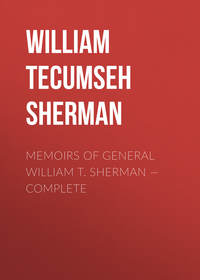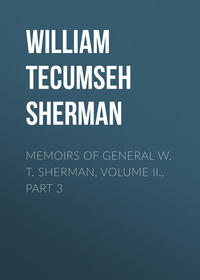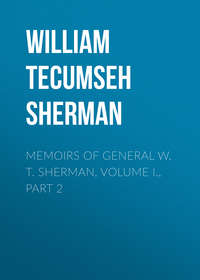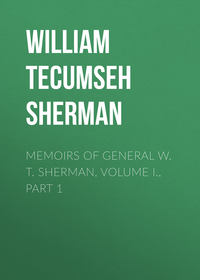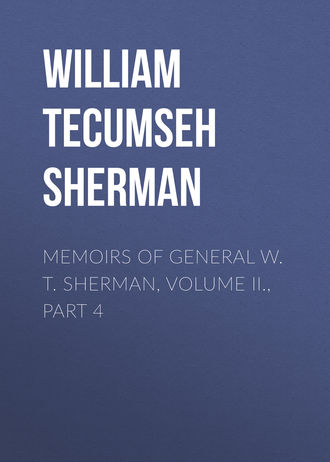 полная версия
полная версияMemoirs of General W. T. Sherman, Volume II., Part 4
Failing to hear of Juarez, we steamed up the coast to the Island of Lobos, and on to Tampico, off which we found the United States steamer Paul Jones, which, drawing less water than the Susquehanna, carried us over the bar to the city, then in possession of the Liberal party, which recognized Juarez as their constitutional President, but of Juarez and his whereabout we could hear not a word; so we continued up the coast and anchored off Brazos Santiago, December 7th. Going ashore in small boats, we found a railroad, under the management of General J. R. West, now one of the commissioners of the city of Washington, who sent us up to Brownsville, Texas. We met on the way General Sheridan, returning from a tour of inspection of the Rio Grande frontier. On Sunday, December 9th, we were all at Matamoras, Mexico, where we met General Escobedo, one of Juarez's trusty lieutenants, who developed to us the general plan agreed on for the overthrow of the empire, and the reestablishment of the republican government of Mexico. He asked of us no assistance, except the loan of some arms, ammunition, clothing, and camp-equipage. It was agreed that Mr. Campbell should, as soon as he could get his baggage off the Susquehanna, return to Matamoras, and thence proceed to Monterey, to be received by Juarez in person as, the accredited Minister of the United States to the Republic of Mexico. Meantime the weather off the coast was stormy, and the Susquehanna parted a cable, so that we were delayed some days at Brazos; but in due time Mr. Campbell got his baggage, and we regained the deck of the Susquehanna, which got up steam and started for New Orleans. We reached New Orleans December 20th, whence I reported fully everything to General Grant, and on the 21st received the following dispatch:
WASHINGTON, December 21,1866.
Lieutenant-General SHERMAN, New Orleans.
Your telegram of yesterday has been submitted to the President. You are authorized to proceed to St. Louis at your convenience. Your proceedings in the special and delicate duties assigned you are cordially approved by the President and Cabinet and this department. EDWIN M. STANTON.
And on the same day I received this dispatch
GALVESTON, December 21, 1866.
To General SHERMAN, or General SHERIDAN.
Will be in New Orleans to-morrow. Wish to see you both on arrival, on matters of importance. LEWIS D. CAMPBELL, Minister to Mexico.
Mr. Campbell arrived on the 22d, but had nothing to tell of the least importance, save that he was generally disgusted with the whole thing, and had not found Juarez at all. I am sure this whole movement was got up for the purpose of getting General Grant away from Washington, on the pretext of his known antagonism to the French occupation of Mexico, because he was looming up as a candidate for President, and nobody understood the animus and purpose better than did Mr. Stanton. He himself was not then on good terms with President Johnson, and with several of his associates in the Cabinet. By Christmas I was back in St. Louis.
By this time the conflict between President Johnson and Congress had become open and unconcealed. Congress passed the bill known as the "Tenure of Civil Office" on the 2d of March, 1867 (over the President's veto), the first clause of which, now section 1767 of the Revised Statutes, reads thus: "Every person who holds any civil office to which he has been or hereafter may be appointed, by and with the advice and consent of the Senate, and who shall have become duly qualified to act therein, shall be entitled to hold such office during the term for which he was appointed, unless sooner removed by and with the advice and consent of the Senate, or by the appointment with the like advice and consent of a successor in his place, except as herein otherwise provided."
General E. D. Townsend, in his "Anecdotes of the Civil War," states tersely and correctly the preliminary circumstances of which I must treat. He says: "On Monday morning, August 5, 1867, President Johnson invited Mr. Stanton to resign as Secretary of War. Under the tenure-of-civil-office law, Mr. Stanton declined. The President a week after suspended him, and appointed General Grant, General-in-Chief of the Army, to exercise the functions. This continued until January 13, 1868, when according to the law the Senate passed a resolution not sustaining the President's action. The next morning General Grant came to my office and handed me the key of the Secretary's room, saying: 'I am to be found over at my office at army headquarters. I was served with a copy of the Senate resolution last evening.' I then went up-stairs and delivered the key of his room to Mr. Stanton."
The mode and manner of Mr. Stanton's regaining his office, and of General Grant's surrendering it, were at the time subjects of bitter controversy. Unhappily I was involved, and must bear testimony. In all January, 1868, I was a member of a board ordered to compile a code of articles of war and army regulations, of which Major-General Sheridan and Brigadier-General C. C. Augur were associate members. Our place of meeting was in the room of the old War Department, second floor, next to the corner room occupied by the Secretary of War, with a door of communication. While we were at work it was common for General Grant and, afterward, for Mr. Stanton to drop in and chat with us on the social gossip of the time.
On Saturday, January 11th, General Grant said that he had more carefully read the law (tenure of civil office), and it was different from what he had supposed; that in case the Senate did not consent to the removal of Secretary of War Stanton, and he (Grant) should hold on, he should incur a liability of ten thousand dollars and five years' imprisonment. We all expected the resolution of Senator Howard, of Michigan, virtually restoring Mr. Stanton to his office, would pass the Senate, and knowing that the President expected General Grant to hold on, I inquired if he had given notice of his change of purpose; he answered that there was no hurry, because he supposed Mr. Stanton would pursue toward him (Grant) the same course which he (Stanton) had required of him the preceding August, viz., would address him a letter claiming the office, and allow him a couple of days for the change. Still, he said he would go to the White House the same day and notify the President of his intended action.
That afternoon I went over to the White House to present General Pope, who was on a visit to Washington, and we found the President and General Grant together. We made our visit and withdrew, leaving them still together, and I always supposed the subject of this conference was the expected decision of the Senate, which would in effect restore Mr. Stanton to his civil office of Secretary of War. That evening I dined with the Hon. Reverdy Johnson, Senator from Maryland, and suggested to him that the best way to escape a conflict was for the President to nominate some good man as Secretary of War whose confirmation by the Senate would fall within the provisions of the law, and named General J. D. Cox, then Governor of Ohio, whose term of office was drawing to a close, who would, I knew, be acceptable to General Grant and the army generally. Mr. Johnson was most favorably impressed with this suggestion, and promised to call on the President the next day (Sunday), which he did, but President Johnson had made up his mind to meet the conflict boldly. I saw General Grant that afternoon at his house on I Street, and told him what I had done, and so anxious was he about it that he came to our room at the War Department the next morning (Monday), the 13th, and asked me to go in person to the White House to urge the President to send in the name of General Cox. I did so, saw the President, and inquired if he had seen Mr. Reverdy Johnson the day before about General Cox. He answered that he had, and thought well of General Cox, but would say no further.
Tuesday, January 14, 1868, came, and with it Mr. Stanton. He resumed possession of his former office; came into that where General Sheridan, General Augur, and I were at work, and greeted us very cordially. He said he wanted to see me when at leisure, and at half-past 10 A.M. I went into his office and found him and General Grant together. Supposing they had some special matters of business, I withdrew, with the remark that I was close at hand, and could come in at any moment. In the afternoon I went again into Mr. Stanton's office, and we had a long and most friendly conversation; but not one word was spoken about the "tenure-of-office" matter. I then crossed over Seventeenth Street to the headquarters of the army, where I found General Grant, who expressed himself as by no means pleased with the manner in which Mr. Stanton had regained his office, saying that he had sent a messenger for him that morning as of old, with word that "he wanted to see him." We then arranged to meet at his office the next morning at half-past nine, and go together to see the President.
That morning the National Intelligencer published an article accusing General Grant of acting in bad faith to the President, and of having prevaricated in making his personal explanation to the Cabinet, so that General Grant at first felt unwilling to go, but we went. The President received us promptly and kindly. Being seated, General Grant said, "Mr. President, whoever gave the facts for the article of the Intelligencer of this morning has made some serious mistakes." The President: "General Grant, let me interrupt you just there. I have not seen the Intelligencer of this morning, and have no knowledge of the contents of any article therein" General Grant then went on: "Well, the idea is given there that I have not kept faith with you. Now, Mr. President, I remember, when you spoke to me on this subject last summer, I did say that, like the case of the Baltimore police commissioners, I did suppose Mr. Stanton could not regain his office except by a process through the courts." To this the President assented, saying he "remembered the reference to the case of the Baltimore commissioners," when General Grant resumed: "I said if I changed my opinion I would give you notice, and put things as they were before my appointment as Secretary of War ad interim."
We then entered into a general friendly conversation, both parties professing to be satisfied, the President claiming that he had always been most friendly to General Grant, and the latter insisting that he had taken the office, not for honor or profit, but in the general interests of the army.
As we withdrew, at the very door, General Grant said, "Mr. President, you should make some order that we of the army are not bound to obey the orders of Mr. Stanton as Secretary of War," which the President intimated he would do.
No such "orders" were ever made; many conferences were held, and the following letters are selected out of a great mass to show the general feeling at the time:
1321 K STREET, WASHINGTON,
January 28,1868, Saturday.
To the President:
I neglected this morning to say that I had agreed to go down to Annapolis to spend Sunday with Admiral Porter. General Grant also has to leave for Richmond on Monday morning at 6 A.M.
At a conversation with the General after our interview, wherein I offered to go with him on Monday morning to Mr. Stanton, and to say that it was our joint opinion be should resign, it was found impossible by reason of his (General Grant) going to Richmond and my going to Annapolis. The General proposed this course: He will call on you to-morrow, and offer to go to Mr. Stanton to say, for the good of the Army and of the country, he ought to resign. This on Sunday. On Monday I will again call on you, and, if you think it necessary, I will do the same, viz., go to Mr. Stanton and tell him he should resign.
If he will not, then it will be time to contrive ulterior measures. In the mean time it so happens that no necessity exists for precipitating matters.
Yours truly,
W. T. SHERMAN, Lieutenant-General.
DEAR GENERAL: On the point of starting, I have written the above, and will send a fair copy of it to the President. Please retain this, that in case of necessity I may have a copy. The President clearly stated to me that he relied on us in this category.
Think of the propriety of your putting in writing what you have to say tomorrow, even if you have to put it in the form of a letter to hand him in person, retaining a copy. I'm afraid that acting as a go-between for three persons, I may share the usual fate of meddlers, at last get kinks from all. We ought not to be involved in politics, but for the sake of the Army we are justified in trying at least to cut this Gordian knot, which they do not appear to have any practicable plan to do. In haste as usual,
W. T. SHERMAN.
HEADQUARTERS ARMIES OF THE UNITED STATES,
January 29, 1888.
DEAR SHERMAN: I called on the President and Mr. Stanton to-day, but without any effect.
I soon found that to recommend resignation to Mr. Stanton would have no effect, unless it was to incur further his displeasure; and, therefore, did not directly suggest it to him. I explained to him, however, the course I supposed he would pursue, and what I expected to do in that case, namely, to notify the President of his intentions, and thus leave him to violate the "Tenure-of-Office Bill" if he chose, instead of having me do it.
I would advise that you say nothing to Mr. Stanton on the subject unless he asks your advice. It will do no good, and may embarrass you. I did not mention your name to him, at least not in connection with his position, or what you thought upon it.
All that Mr. Johnson said was pacific and compromising. While I think he wanted the constitutionality of the "Tenure Bill" tested, I think now he would be glad either to get the vacancy of Secretary of War, or have the office just where it was during suspension. Yours truly,
U. S. GRANT.
WASHINGTON D. C., January 27, 1868.
To the President.
DEAR SIR: As I promised, I saw Mr. Ewing yesterday, and after a long conversation asked him to put down his opinion in writing, which he has done and which I now inclose.
I am now at work on these Army Regulations, and in the course of preparation have laid down the Constitution and laws now in force, clearer than I find them elsewhere; and beg leave herewith to inclose you three pages of printed matter for your perusal. My opinion is, if you will adopt these rules and make them an executive order to General Grant, they will so clearly define the duties of all concerned that no conflict can arise. I hope to get through this task in the course of this week, and want very much to go to St. Louis. For eleven years I have been tossed about so much that I really do want to rest, study, and make the acquaintance of my family. I do not think, since 1857, I have averaged thirty days out of three hundred and sixty-five at home.
Next summer also, in fulfillment of our promise to the Sioux, I must go to Fort Phil Kearney early in the spring, so that, unless I can spend the next two months at home, I might as well break up my house at St. Louis, and give up all prospect of taking care of my family.
For these reasons especially I shall soon ask leave to go to St. Louis, to resume my proper and legitimate command. With great respect,
W. T. SHERMAN, Lieutenant-General.
[Inclosure]
WASHINGTON, D. C., January 25, 1868.
MY DEAR GENERAL: I am quite clear in the opinion that it is not expedient for the President to take any action now in the case of Stanton. So far as he and his interests are concerned, things are in the best possible condition. Stanton is in the Department, got his secretary, but the secretary of the Senate, who have taken upon themselves his sins, and who place him there under a large salary to annoy and obstruct the operations of the Executive. This the people well enough understand, and he is a stench in the nostrils of their own party.
I thought the nomination of Cox at the proper juncture would have been wise as a peace-offering, but perhaps it would have let off the Senate too easily from the effect of their arbitrary act. Now the dislodging of Stanton and filling the office even temporarily without the consent of the Senate would raise a question as to the legality of the President's acts, and he would belong to the attacked instead of the attacking party. If the war between Congress and the President is to go on, as I suppose it is, Stanton should be ignored by the President, left to perform his clerical duties which the law requires him to perform, and let the party bear the odium which is already upon them for placing him where he is. So much for the President.
As to yourself, I wish you as far as possible to keep clear of political complications. I do not think the President will require you to do an act of doubtful legality. Certainly he will not without sanction of the opinion of his Attorney-General; and you should have time, in a questionable case, to consult with me before called upon to act. The office of Secretary of War is a civil office, as completely so as that of Secretary of State; and you as a military officer cannot, I think, be required to assume or exercise it. This may, if necessary, be a subject for further consideration. Such, however, will not, I think, be the case. The appeal is to the people, and it is better for the President to persist in the course he has for some time pursued–let the aggressions all come from the other side; and I think there is no doubt he will do so. Affectionately, T. EWING.
To–Lieutenant-General SHERMAN.
LIBRARY ROOM, WAR DEPARTMENT,
WASHINGTON, D. C., January 31, 1868.
To the President:
Since our interview of yesterday I have given the subject of our conversation all my thoughts, and I beg you will pardon my reducing the same to writing.
My personal preferences, as expressed, were to be allowed to return to St. Louis to resume my present command, because my command was important, large, suited to my rank and inclination, and because my family was well provided for there in house, facilities, schools, living, and agreeable society; while, on the other hand, Washington was for many (to me) good reasons highly objectionable, especially because it is the political capital of the country; and focus of intrigue, gossip, and slander. Your personal preferences were, as expressed, to make a new department East, adequate to my rank, with headquarters at Washington, and assign me to its command, to remove my family here, and to avail myself of its schools, etc.; to remove Mr. Stanton from his office as Secretary of War, and have me to discharge the duties.
To effect this removal two modes were indicated: to simply cause him to quit the War-Office Building, and notify the Treasury Department and the Army Staff Departments no longer to respect him as Secretary of War; or to remove him and submit my name to the Senate for confirmation.
Permit me to discuss these points a little, and I will premise by saying that I have spoken to no one on the subject, and have not even seen Mr. Ewing, Mr. Stanbery, or General Grant, since I was with you.
It has been the rule and custom of our army, since the organization of the government, that the second officer of the army should be at the second (in importance) command, and remote from general headquarters. To bring me to Washington world put three heads to an army, yourself, General Grant, and myself, and we would be more than human if we were not to differ. In my judgment it world ruin the army, and would be fatal to one or two of us.
Generals Scott and Taylor proved themselves soldiers and patriots in the field, but Washington was fatal to both. This city, and the influences that centre here, defeated every army that had its headquarters here from 1861 to 1864, and would have overwhelmed General Grant at Spottsylvania and Petersburg, had he not been fortified by a strong reputation, already hard-earned, and because no one then living coveted the place; whereas, in the West, we made progress from the start, because there was no political capital near enough to poison our minds, and kindle into life that craving, itching for fame which has killed more good men than bullets. I have been with General Grant in the midst of death and slaughter when the howls of people reached him after Shiloh; when messengers were speeding to and from his army to Washington, bearing slanders, to induce his removal before he took Vicksburg; in Chattanooga, when the soldiers were stealing the corn of the starving mules to satisfy their own hunger; at Nashville, when he was ordered to the "forlorn hope" to command the Army of the Potomac, so often defeated–and yet I never saw him more troubled than since he has been in Washington, and been compelled to read himself a "sneak and deceiver," based on reports of four of the Cabinet, and apparently with your knowledge. If this political atmosphere can disturb the equanimity of one so guarded and so prudent as he is, what will be the result with me, so careless, so outspoken as I am? Therefore, with my consent, Washington never.
As to the Secretary of War, his office is twofold. As a Cabinet officer he should not be there without your hearty, cheerful assent, and I believe that is the judgment and opinion of every fair-minded man. As the holder of a civil office, having the supervision of moneys appropriated by Congress and of contracts for army supplies, I do think Congress, or the Senate by delegation from Congress, has a lawful right to be consulted. At all events, I would not risk a suit or contest on that phase of the question. The law of Congress, of March 2, 1867, prescribing the manner in which orders and instructions relating to "military movements" shall reach the army, gives you as constitutional Commander-in-Chief the very power you want to exercise, and enables you to prevent the Secretary from making any such orders and instructions; and consequently he cannot control the army, but is limited and restricted to a duty that an Auditor of the Treasury could perform. You certainly can afford to await the result. The Executive power is not weakened, but rather strengthened. Surely he is not such an obstruction as would warrant violence, or even s show of force, which would produce the very reaction and clamor that he hopes for to save him from the absurdity of holding an empty office "for the safety of the country."
This is so much as I ought to say, and more too, but if it produces the result I will be more than satisfied, viz., that I be simply allowed to resume my proper post and duties in St. Louis. With great respect, yours truly,
W. T. SHERMAN, Lieutenant-General.
On the 1st of February, the board of which I was the president submitted to the adjutant-general our draft of the "Articles of War and Army Regulations," condensed to a small compass, the result of our war experience. But they did not suit the powers that were, and have ever since slept the sleep that knows no waking, to make room for the ponderous document now in vogue, which will not stand the strain of a week's campaign in real war.
I hurried back to St. Louis to escape the political storm I saw brewing. The President repeatedly said to me that he wanted me in Washington, and I as often answered that nothing could tempt me to live in that center of intrigue and excitement; but soon came the following:
HEADQUARTERS ARMY OF THE UNITED STATES,
WASHINGTON, February 10, 1868.
DEAR GENERAL: I have received at last the President's reply to my last, letter. He attempts to substantiate his statements by his Cabinet. In this view it is important that I should have a letter from you, if you are willing to give it, of what I said to you about the effect of the "Tenure-of-Office Bill," and my object in going to see the President on Saturday before the installment of Mr. Stanton. What occurred after the meeting of the Cabinet on the Tuesday following is not a subject under controversy now; therefore, if you choose to write down your recollection (and I would like to have it) on Wednesday, when you and I called on the President, and your conversation with him the last time you saw him, make that a separate communication.
Your order to come East was received several days ago, but the President withdrew it, I supposed to make some alteration, but it has not been returned. Yours truly,
U. S. GRANT.
[TELEGRAM.]
WASHINGTON, D. C., February 18, 1868.
Lieutenant-General W. T. SHERMAN, St. Louis.


